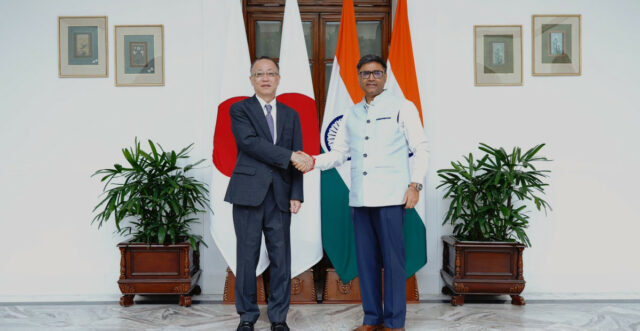
Foreign Secretary Vikram Misri held talks with Japan’s Vice-Minister for Foreign Affairs Takehiro Funakoshi in New Delhi on Monday. The meeting, which comes ahead of PM Modi’s expected visit to Japan, reinforced the deepening partnership between the two countries amid evolving geopolitical dynamics in the Indo-Pacific region. Discussions spanned defence cooperation, economic security, trade, infrastructure, digital technologies and people-to-people exchanges.
Both sides reiterated their commitment to the “Special Strategic and Global Partnership.” A relationship that has matured over the past decade and has become central to regional peace and stability. The dialogue comes amid political uncertainty in Japan following a surprise surge of the far-right Sanseito party in recent elections and mounting regional tensions, particularly over Taiwan.
The meeting also laid the groundwork for India’s hosting of the QUAD leaders’ summit later this year, which will bring together leaders from India, Japan, the United States, and Australia. While dates are not yet out, the summit is expected to serve as a crucial platform to advance shared priorities in the Indo-Pacific.
Strategic Pillar For Indo-Pacific
“India and Japan share not only mutual economic interests but also a convergence of strategic values. The dialogue today was a step forward in consolidating those pillars,” a senior official familiar with the discussions said.
Foreign Secretary Misri and Vice-Minister Funakoshi reaffirmed the centrality of India-Japan cooperation to shaping a “Free and Open Indo-Pacific”—a vision that has underpinned several bilateral and Quad initiatives since 2014, when the relationship was elevated to a Special Strategic & Global Partnership.
Japan’s Ambassador to India Ono Keiichi recently underscored India’s irreplaceable role in the Quad framework, stating, “Without India, Quad cannot exist.” His remarks, delivered at a public forum, stressed that India’s growing global stature and strategic autonomy make it an indispensable partner in addressing regional challenges.
Growing Challenges And Shared Concerns
Recent political developments in Japan have injected uncertainty into regional diplomatic planning. Prime Minister Shigeru Ishiba’s ruling coalition suffered a major setback in the latest parliamentary elections, losing its upper house majority to a resurgent Sanseito party. With internal calls for his resignation mounting, the leadership in Tokyo faces increasing pressure, potentially affecting the timing of Prime Minister Modi’s visit.
Nevertheless, Japanese officials have affirmed continuity in foreign policy. Tokyo sees its partnership with New Delhi as critical, especially given the rising tensions in the Taiwan Strait and the pressing need for resilient supply chains for semiconductors and other critical technologies.
“Taiwan is not just a flashpoint, it’s a critical node in our economic and technological ecosystems,” Ambassador Ono said. He warned that any escalation could have severe consequences for both Japanese and Indian economies.
Economic Backbone And Future Outlook
Japan remains one of India’s most significant economic partners. With over $7 billion in Foreign Direct Investment in 2023, and being the second largest equity investor in India after the United States over the past two decades, the economic dimension continues to underpin bilateral ties.
The dialogue also touched upon enhancing cooperation in advanced technologies, green energy and connectivity initiatives that align with India’s Act East Policy and Japan’s Free and Open Indo-Pacific vision.
Furthermore, Japan’s ageing population and India’s growing talent pool open new possibilities in human resource mobility and educational exchanges.




